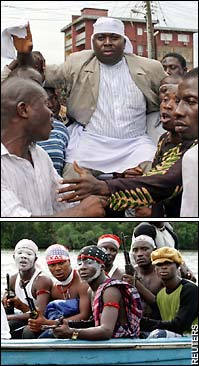Entered into the database on Tuesday, July 12th, 2005 @ 00:54:30 MST
If the rising cost of the world's oil can be blamed on any one man, a portly
African militia leader with a poster of Osama bin Laden glowering from his wall
is the most likely culprit. Al-Haji Mujahid Dokubo Asari, the leader of a motley collection of gunmen styling
themselves the Niger Delta People's Volunteer Force, managed to push the world
oil price above $50 a barrel last year. Mr Asari claims two million followers, but he probably has only a few hundred
gunmen His homeland in the verdant Delta region of southern Nigeria holds the largest
oil reserves in sub-Saharan Africa and Mr Asari aims to seize this wealth for
his Ijaw tribe. Last September his gunmen rocked the international oil market by launching
attacks across the Delta, costing hundreds of lives and threatening some of
the world's largest companies. "We seek self-determination and control of our natural resources by any
means necessary, and the only means is by armed struggle and confrontation,"
Mr Asari said. "Our struggle is like those in Chechnya, Kosovo, Palestine and South Africa.
That is how we are going to fight. We are not going to just sit down. We are
capable of defending ourselves." Mr Asari, 40, who shuns military fatigues and sports a trilby and a silver-topped
cane, is an unabashed admirer of bin Laden. Songs praising his "gallantry"
echo from a stereo in his spacious home in Port Harcourt, the Delta's largest
city. Mr Asari's last round of bloodletting won him direct talks with President Olusegun
Obasanjo and forced Shell, the Anglo-Dutch oil giant, to evacuate 254 staff
from the Delta. During earlier fighting, in March 2003, a collection of militias briefly halted
almost 40 per cent of Nigeria's daily output of 2.3 million barrels. Mr Obasanjo
had to deploy the army and navy to restore order. Mr Asari accused Shell and the other oil companies of sustaining Nigeria's
"arrogant" government. "They are aiding evil and they must withdraw
honourably," he said. "If not, they will be forced to pull out. We
will confront them with any means available to us." Mr Asari wants an independent Ijaw state and claims two million followers.
But he probably has only a few hundred gunmen, their weapons bought with the
proceeds of oil smuggling. Government officials dismiss the idea that he poses
a major threat but he is exploiting genuine popular anger. Mired in corruption and misrule, the Delta's people have seen little benefit
from their natural wealth. Oil companies stand accused of damaging the environment
and wilfully neglecting their host communities. "We are not satisfied with what they are doing to clean-up oil spillages,"
said Dr Roseline Konya, the environmental commissioner for Rivers State, with
four million of the Delta's people. "We have suffered since oil was found in the Delta. We are paying a high
price. Instead of oil being a benefit, it has become a problem." A Shell spokesman said 97 per cent of spills were caused by oil smugglers tampering
with pipelines and 96 per cent of the revenue from Shell's operation went to
the government. Shell employs 5,000 people in Nigeria and provides another 27,000 jobs indirectly.
All its main installations meet international standards for environmental cleanliness. Yet the Delta remains one of the poorest and most volatile places on Earth.
For as long as this persists, the power to cause tremors worldwide may rest
with Mr Asari and his gunmen.
